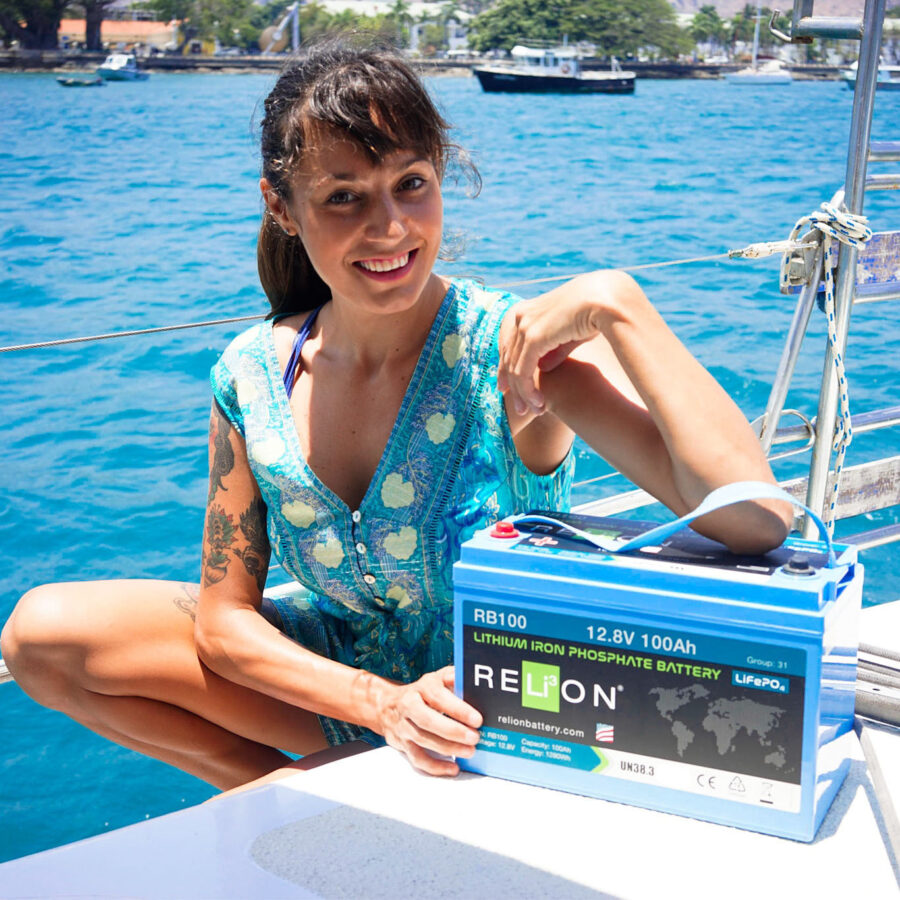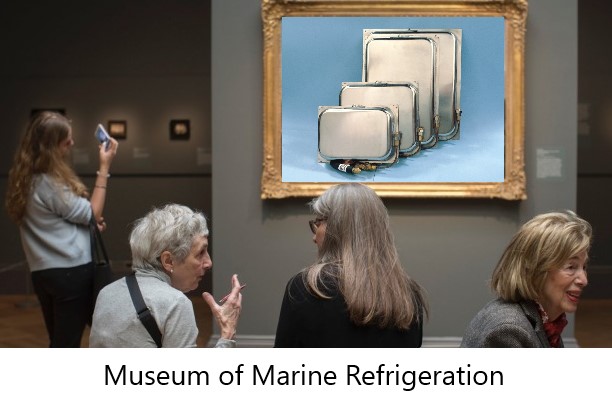Phone: (301) 352-5738
Email: info@CoastalClimateControl.com
Office | Warehouse:
1598 Whitehall Road, Suite D
Annapolis, Maryland 21409
We hear it all the time – flexible solar panels are not worth buying, they only last a short time, they never give out the watts they say they will, they are not as durable as glass panels, the list goes on and on of the laments by those who bought a solar panel that didn’t live up to its manufacturer’s hype.
Lightning, the moving magnetic north pole, and your compass
We have just resolved the first known instance of a Solara Power M solar panel failure out of the 2,200+ sold by Coastal Climate Control to date. I’m sure there are some out there that will have suffered accidental damage, but this failure was not from abuse, misuse, or a manufacturing defect, but from an act of a god. The Greek god Zeus, to be exact, who apparently sent a lightning bolt earthwards, rendering this panel toast.
Getting there can be daunting, being there is sweet.
With the hustle of the Annapolis and Ft. Lauderdale Boat Shows behind us, there’s been hardly any time to take a breather before heading off across The Pond for the huge Marine Equipment Trade Show (METS) in Amsterdam. I’m always up for adventure, and a transatlantic trip usually obliges, but it can also have its good and not-so-good elements.
For example, although I appreciate the sentiment, I do wish people wouldn’t wish me a “safe flight”. I too really, really wish it to be a safe flight, and in fact I’m banking my life on it. But I also hope for it to be comfortable, uneventful, and punctual, and good wishes in those veins would be far better received by yours truly.
Progress is often shown by changes, but is all change progress?
I wish to apologize to all those who got a drenching on the last day of the Ft. Lauderdale International Boat Show last Sunday. It seems that my comment to the traffic cop that: “Looks like this will be the first show in many years that we won’t have rain” spurred the rain gods into action, resulting in the deluge that followed that afternoon.
It made for a slower than normal Sunday in a slower than normal show that had many exhibitors mulling over theories of why that was. We heard it was a general slowdown in the economy; lack-luster promotion; changes in the show lay-out; that “T” word; and the ever-increasing expense of “doing” these types of shows, both as an exhibitor and as an attendee.
“If things don’t change, they stay the same”, so sayeth someone to someone else for some reason sometime in the past. We get used to routines and to having stuff around us work in a particular way, and get caught out when things fall outside the norms. I’m often leaving rental cars unlocked, as my personal car has a “proximity” key that does that sort of stuff for you as you walk away.
What's the difference between a Boat Show and an RV Show?
The ride home into Annapolis at the end of the day usually means navigating heavy traffic on the highway. Three lanes is usually enough to keep everyone rolling along smoothly, but often the left hand lane, the “fast” lane if you will, is seen to be slower than the other two. After much observation, I have come to the conclusion that some drivers must think they are fast and so have a right to occupy a slot in the left lane conga line. Unfortunately, these fast thinkers seem to have a disconnect between their head and their right foot when going uphill, and so slow down the pace and frustrate those bunched up behind.
I had the chance to test the theory this past week on Coastal Climate Control’s road trip to exhibit at America’s Largest RV Show. No, really, that is the actual name of the show, and to those of you wondering, “RV” is for Recreational Vehicle. It was in chocolate land, Hershey Pennsylvania, and was indeed very big to my eyes, but then this is the only RV show I’ve ever been to.
Coastal was there dipping our toes in the RV market to see what the industry is about, and where we might find some sales opportunities. Our main focus was on solar products, and we had some examples of some glass panels that Coastal is now offering from Solarland USA, plus our usual marine items from Solara and Solbian.
Solar Tariffs - Feel the Pain?
When it comes to tariffs, you’ll have to go a long way to find anything to beat the 249% tariff we were recently charged on a couple of small, specialized marine solar panels imported from Solara in Germany. These smaller panels are not as popular here in North America as they are in Europe and around the Med, but we were selling one or two along the way, and needed to replace stock. It transpired that the cells in these panels were manufactured in China by a company that is not on the list of preferred solar manufacturers, and so we got walloped with the huge tariff.
“It is good to know what our species is capable of when it gets out of its own way”.
That was a comment I read recently, referring to the moon landings 50 years ago. But there’s a fascinating back story to the Apollo 11 adventure that is worthy of note for its pioneering spirit and sense of bravado and derring-do.
Neil Armstrong could not have said it better than “That’s one small step for (a) man, one giant leap for mankind”. The amount of innovation and inventiveness required to overcome the technical challenges of getting man to the moon was astronomical in itself. Even so, some of the methods they employed have their roots in ancient navigation practices, and were not what one would expect to find in a spacecraft.
Fast running refrigeration has its benefits, and it has a downside, too.
There’s quite a variety of passers-by to be seen from my front porch of an evening, and most seem to be walking a dog or two, or three. The majority of walkers fit in a velocity band somewhere between comfortable stroll and brisk jog, but there are also those on the fringes of the extremes, and these are the most interesting to observe.
At the hyper-speed end is Speedy Meanie, and he’s a runner on a mission. He’s lean and long-legged, and usually shirtless (in Summer anyway). He and his hound bound along in perfect synchronicity and appear out of nowhere in a flash, so you need a keen eye to catch him. He’s well known in the neighborhood for having a bit of a mean temper, and woe betide anyone that dares to get in his way. If Speedy Meanie arrives just as one happens to be putting the bins out, one can get an earful of colorful curses if he has to maneuver around them.
At the opposite end of the scale is dear old Ambling Archie. Archie is a truly loveable little dog, and as well as being small, he is very, very slow. Unlike Speedy Meanie, it is Archie that controls the pace, which is excruciatingly slow and difficult to watch, while his companion digs around in his smart-phone for something interesting to help pass the time. Ambling Archie doesn’t go very far, just to the end of the block and back, but it’s all the exercise he needs, and it’s quality time for him and his master.
Prepare for those inconvenient power outages, or for the trending living-off-the-grid
We sell a fabulous battery – Firefly’s 2v/4v model, which has all the advantages of their popular Group 31, but in a different format. Here's where I intend to use them in a future project.
With the increasing frequency of heavy storms and threats of power outages, I’ve been reviewing the emergency battery back-up system I have set up in my basement. This currently consists of 8x 185 amp/hr AGM batteries with an Inverter-Charger, plus a mains/generator Transfer Switch with generator plug-in access. There is also a Transfer Box that has six mains/inverter transfer switches with associated breakers and balancing meters which supply six circuits: the fridge, kitchen outlets, sump pump, basement outlets, front room outlets, and the oil-fired furnace.
An Englishman’s home is his castle they say, so as a young lad I was intrigued as to why there were doors in the high wooden fencing separating my grandma’s back yard in England from her neighbors’ gardens. That sort of thing was against the norm, as one mostly kept oneself to oneself except when spying on the neighbors from behind net curtains.
The reason became clear when it was explained that grandma’s garden shed, that ugly, half-buried thing made of corrugated steel panels with earth covering the roof, was in fact a communal six-person neighborhood bomb shelter during WW2. As a tool shed it was dark, damp and dank, and I imagine it was probably no more welcoming in its original incarnation.
The first clue that the upcoming week was to be no normal week in Annapolis came during a trip to the local grocery store on Sunday. It seemed unusually busy, and closer inspection of the wandering shoppers showed that many were wearing clothing and hats emblazoned with emblems and logos depicting their support of or attachment to the US Naval Academy. The next clue came to light from a quick scan of my Eastport neighborhood, where unfamiliar vehicles, flags, and gently rocking porch occupants adorned a number of residences.
OK, I’ve got it! It’s Commissioning Week at the Naval Academy, and a good number of locals have rented their houses out to make way for families of graduating Midshipmen while pocketing a sizeable chunk of cash in the process. And why not indeed.
For those not familiar with Annapolis, it must be understood that the US Naval Academy is Annapolis, and Annapolis is the US Naval Academy. The two are inseparable, which will be apparent from a quick look at a map where the magnitude and proximity of the Academy relative to the town is evident. This is no distant fixture perched on a remote hill, but right there breathing down the necks of the shops on Main Street and the boats at City Dock.
Having to accommodate around 4,500 Midshipmen, plus staff and ancillary workers, it is a sizeable chunk of real estate and provides much employment and income for the surrounding area. Don’t get the impression that Annapolis is alive and crawling with marauding Mids, as they are for the most part incarcerated behind the imposing perimeter walls. The few lucky ones that are allowed out for brief sojourns into the real world are noticeable only by being impeccably dressed in crisp uniforms.
So what is Commissioning Week all about?
We all make mistakes … don’t we? For me the worst things seem to happen when I rush something or am pushed to a time limit. And having someone look over my shoulder adds an even greater level of stress that can end in a right old fustercluck. Take the time many years ago when a customer insisted he watch as I installed a new alternator and regulator.
I hadn’t been in business that long, and was scrambling for any work I could get in deep, dark rural Virginia, so the chance to install a high-output alternator and remote regulator on a sailboat was welcome indeed. But I hadn’t reckoned on the owner insisting he be on board and watch me, and after a while I just knew this wasn’t going to work. “Don’t worry about me” he said, “I’ll just sit here and keep quiet. You’ll not even know I’m here.”
We’re getting a lot of inquiries lately asking for the starting current figure for the compressors in the various air conditioners Coastal Climate Control offers. Why is that? We guess it is because increasing numbers of boaters and installers want to run air conditioners from small, often portable, generators, or from inverters, and they are trying to match the compressor load to the generator/inverter output. Let’s first take a look at what this starting current is all about. If you’re not interested in the technical mumbo-jumbo skip to Part 2.
I’ve been thinking about a lot of things lately. I don’t know why, maybe it was the winter blues bringing on a bout of the melancholies. In particular, I’m often fascinated with things that just seem to happen, but without any obvious visible clues as to why or how. Take the theory of flight, for example.
I was on a ‘plane recently, and got to thinking about the whole theory of lift and flight. We are taught that air flows over the wing and bla bla bla. But air doesn’t actually flow over the wing, now does it? No, it’s the wing that slices through the air.
1. Box no longer reaches desired temperature set point
A refrigerator box should be kept at 35-40F for safe food storage. If your box used to do this, but doesn’t anymore, then you could have insulation degradation, perhaps your thermostat isn’t telling the compressor to turn on when the box gets warmer, there may be a refrigerant leak, or your system may simply be showing its age.
2. System works sometimes OK, sometimes not
You can bet your bottom paint that everything will be hunky-dory for month after month, and that the gremlins will strike on the first day of your annual cruise with all the family on board. Time to get proactive and get the fridge fairies on your side with a nice new, shiny ,reliable, fridge system.
I think we all get the idea of what a “By-Pass” is, whether it’s a by-pass road to divert traffic around a city, or a heart by-pass operation to channel blood supply around a restricted artery. So what does a By-Pass Diode do in a solar panel? Obviously it must divert something around something, but what, why, and how?
Right away, let’s quell the myth that By-Pass Diodes are there primarily to improve performance under shaded conditions.
We had another highly successful show in Miami this year, with a lot of interest in our solar offerings, but we still find it necessary to spend considerable time with interested parties having to explain the what’s what of solar power for boats. Evidently there is still a lot of misinformation out there on the subject, so this seems like a good time to re-hash one of our most popular blogs from many moons ago. Here follows a list of ten myths and busts in an effort to set the record straight.
Continuing on the theme of the previous blog, regarding wiring individual batteries in parallel to make a higher capacity bank, now we can look at the best way to wire them up.
I included a teaser graphic in that last blog that showed two batteries wired in parallel and with the two main cables, one positive and one negative, both connected to one battery. I expected a flurry of comments on this, but to my surprise received only one. Mr. D said that the configuration shown would result in uneven current draw from each battery, resulting in greatly reduced cycle-life of the first battery in line. Is that so?
And if so, what is the best configuration? What are the alternatives?
Yipee! Time to put on the testing hat once again.
I saw some communications in a trade journal the other day discussing the common practice of wiring batteries in parallel to increase capacity. Specifically, one writer was warning of the possibility of a cell shorting in one of the batteries, resulting in the other batteries all discharging at a high rate of current into the short circuited cell leading to an apocalyptic event below decks. Is he/she correct? Well, yes and no.
Yes, this is very much a possibility, but is dependent on battery type. An old timer, like yours truly, will probably adhere to the notion that the likelihood of a shorted cell is real, but that’s because our heads are still stuck in “the good old days”, and we are not being practical.
Let’s think about this. How can a cell, one of six in a 12 volt lead acid battery, become short circuited?
It’s a boat. Something’s going to break, and if you’re in the middle of the ocean or in a deserted anchorage in Paradise, who’s going to fix it? There’s no handy-dandy repair chappie down the road, and no one to beg come and mend it, so if you don’t fix it, it stays broke. Simple.
For household appliances, whether in a terrestrial abode or in use on a vessel, things may soon be easier and cheaper to fix, thanks to proposed regulations being put forward in Europe and some 18 US states. Loosely termed “Right to Repair” bills, these would compel manufacturers to make products that come apart easily for inspection, and to have instructions and spare parts readily available to anyone wanting to attempt a repair.






